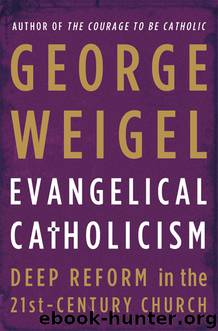Evangelical Catholicism by George Weigel

Author:George Weigel [Weigel, George]
Language: eng
Format: epub
ISBN: 9780465038916
Publisher: Basic Books
Liturgical Time as Countercultural Time
Postmodernity flattens and profanes time: thus the Sabbath becomes the “weekend,” Advent and Christmas become “the holidays,” Easter is the “Spring Festival,” and so forth. Evangelical Catholicism, by contrast, lives in time in order to prepare the people of the Church for the time beyond time that is the Wedding Feast of the Lamb in the Kingdom of God. Rather than accommodating the conventions of secular time by transferring some holy days to Sundays and canceling other holy days of obligation when they fall near Sundays, the liturgical calendar of twenty-first-century Evangelical Catholicism should be deliberately countercultural, embodying a distinct way of life that points beyond the flattened “now” of a world without transcendence to the eschatological horizon of a future in which “God [is] everything to everyone” [1 Corinthians 15.28].
Thus the reform of the reform of the liturgical calendar ought to begin with the restoration of Sundays after Epiphany and Sundays after Pentecost, and the suppression of Sundays of “Ordinary Time.” There is nothing “ordinary” about Sunday, the weekly festival of the Resurrection, the eighth day of the New Creation and the Sabbath of the New Covenant. Nor is there anything “ordinary” about the Sundays after the Epiphany—the great solemnity of the Lord’s manifestation to the world and to history—and Pentecost—the birthday of the Church and the beginning of the mission to the nations. Catholics who live in the “time of the Church” will live in the penumbra of those two great feasts and will know that they are not “ordinary” in so living.
The restoration of Sundays after Epiphany will also permit a return to biblical and liturgical clarity in the celebration of the Christmas season, which has been turned impossibly inside-out by the transfer of Epiphany to Sunday and the imperative of beginning “Ordinary Time” immediately after the Solemnity of the Baptism of the Lord. Consider, for example, the thoroughly confused sequence of Gospel readings in 2010, according to the liturgical calendar in force at the time:
Download
This site does not store any files on its server. We only index and link to content provided by other sites. Please contact the content providers to delete copyright contents if any and email us, we'll remove relevant links or contents immediately.
Resisting Happiness by Matthew Kelly(3331)
The Social Psychology of Inequality by Unknown(3011)
Day by Elie Wiesel(2773)
Designing Your Life by Bill Burnett(2726)
The Giving Tree by Shel Silverstein(2325)
Human Design by Chetan Parkyn(2065)
The Supreme Gift by Paulo Coelho(1954)
Angels of God: The Bible, the Church and the Heavenly Hosts by Mike Aquilina(1948)
Hostage to the Devil by Malachi Martin(1798)
Jesus of Nazareth by Joseph Ratzinger(1796)
Augustine: Conversions to Confessions by Robin Lane Fox(1763)
7 Secrets of Divine Mercy by Vinny Flynn(1725)
Dark Mysteries of the Vatican by H. Paul Jeffers(1703)
The Vatican Pimpernel by Brian Fleming(1695)
St. Thomas Aquinas by G. K. Chesterton(1625)
Saints & Angels by Doreen Virtue(1599)
The Ratline by Philippe Sands(1564)
My Daily Catholic Bible, NABRE by Thigpen Edited by Dr. Paul(1482)
Called to Life by Jacques Philippe(1473)
